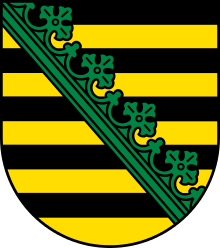Michael Kretschmer
| Michael Kretschmer | |
|---|---|
.jpg) | |
| Minister President of Saxony | |
|
Assumed office 13 December 2017 | |
| Deputy | Martin Dulig |
| Preceded by | Stanislaw Tillich |
| Leader of the Christian Democratic Union in Saxony | |
|
Assumed office 9 December 2017 | |
| Deputy | Barbara Klepsch |
| Preceded by | Stanislaw Tillich |
| General Secretary of the Christian Democratic Union in Saxony | |
|
In office 1 December 2004 – 9 December 2017 | |
| Leader |
Georg Milbradt Stanislaw Tillich |
| Preceded by | Hermann Winkler |
| Succeeded by | Alexander Dierks |
| Member of the Bundestag for Görlitz | |
|
In office 22 September 2002 – 24 October 2017 | |
| Preceded by | Georg Janovsky |
| Succeeded by | Tino Chrupalla |
| Personal details | |
| Born |
7 May 1975 Görlitz, East Germany (now Germany) |
Michael Kretschmer (born 7 May 1975) is a German CDU politician. He serves as the Minister President of Saxony since 13 December 2017.[1]
Political career
Member of Parliament, 2002–2017
From 2002 to 2017 Kretschmer was member of the Bundestag as directly elected representative for Görlitz. He first served on the Committee on Education, Research and Technology Assessment. From 2009 to 2017 he was one of the vice chairs of the CDU/CSU parliamentary group, under the leadership of chairman Volker Kauder.[2]
In the negotiations to form a Grand Coalition of Chancellor Angela Merkel's Christian Democrats (CDU together with the Bavarian CSU) and the SPD following the 2013 federal elections, Kretschmer led the CDU/CSU delegation in the working group on cultural and media affairs; his counterpart of the SPD was Klaus Wowereit.
Minister-President of Saxony, 2017–present
On 18 October 2017, Stanislaw Tillich announced his resignation as Minister President of Saxony and suggested that Kretschmer should replace him.[3] He is only the fourth and also the youngest person to hold that office.[4]
As one of Saxony’s representatives at the Bundesrat, Kretschmer has been serving as member of the Committee on Foreign Affairs since 2017. In addition, he is a member of the German-Russian Friendship Group set up in cooperation with Russia's Federation Council.
In the negotiations to form a fourth cabinet under Merkel following the 2017 federal elections, Kretschmer co-chaired the working group on transport and infrastructure, alongside Alexander Dobrindt and Sören Bartol.
Other activities
- Association of German Foundations, Member of the Parliamentary Advisory Board
- Development and Peace Foundation (SEF), Deputy Chairman of the Board of Trustees[5]
- Dresden Frauenkirche, Ex-Officio Member of the Board of Trustees[6]
- Helmholtz Association of German Research Centres, Member of the Senate
- Max Planck Institute for the Physics of Complex Systems, Member of the Board of Trustees
- Evangelisches Studienwerk Villigst, Member of the Board of Trustees (2009-2013)
- Federal Agency for Civic Education, Member of the Board of Trustees (2002-2005)
Political positions
In June 2017, Kretschmer voted against Germany’s introduction of same-sex marriage.[7]
Controversy
During his tenure as Secretary General of the CDU in Saxony, Kretscher faced criticism after reports surfaced in 2010 that personal meetings with party chairman and Minister-President Stanislaw Tillich were offered to potential corporate sponsors in exchange for donations.[8]
References
- ↑ "Michael Kretschmer ist neuer Ministerpräsident von Sachsen". Retrieved 2017-12-13.
- ↑ "Deutscher Bundestag - Kretschmer, Michael". Deutscher Bundestag (in German). Retrieved 2017-11-04.
- ↑ "Merkel Ally Resigns as Saxony's Leader After Losses to AfD". Bloomberg.com. 2017-10-18. Retrieved 2017-11-04.
- ↑ Jörg Schurig and Martin Fischer (December 10, 2017), Michael Kretschmer – vom Wahlverlierer zum Parteikapitän Leipziger Volkszeitung.
- ↑ Board of Trustees Development and Peace Foundation (SEF).
- ↑ Board of Trustees Dresden Frauenkirche.
- ↑ Diese Unionsabgeordneten stimmten für die Ehe für alle Die Welt, June 30, 2017.
- ↑ Andreas Illmer (February 27, 2010), Donation scandal surrounding German conservatives widens Deutsche Welle.
External links
| Wikimedia Commons has media related to Michael Kretschmer. |

